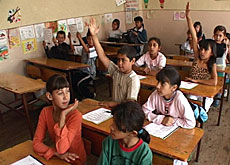
Swiss projects give hope to Roma children

In a far western corner of Ukraine is a small school in which the Swiss have been taking a keen interest.
The primary school in the Transcarpathian town of Mukachevo is popular among Roma children in the area, and in 2004 sent a record number of its pupils to technical colleges.
The Swiss Agency for Development and Cooperation (SDC) has helped to turn the crumbling building into a warm and cheerful retreat for children from the nearby Roma settlement.
The SDC paid SFr32,000 ($24,550) for the installation of the school’s heating system, gas supply, and a modern toilet and shower room, where pupils can be cleaned up and treated for minor ailments such as fleas.
The cosy, well-equipped, brightly painted classrooms are a world apart from the wretched conditions prevailing in the Roma ghetto, home to 5,000 people.
Shantytown
The shacks that define this shantytown are often no bigger than a cupboard, but still they are home to large families.
Electricity is only available in the middle of the night: the authorities cut off the daytime supply for non-payment of bills. There are a few water sources across the ghetto, but no bathing facilities.
Children play barefoot among heaps of rubbish. Women cook on open-air stoves, while the men are out trawling through Mukachevo’s trash in search of recyclable materials.
Toddlers in filthy rags jump aside as a weary horse drawing a cart piled high with scrap metal makes its wobbly way back home through the narrow, pitted streets of the settlement.
One woman shows me around her tiny house, its peeling walls decked with brightly coloured shawls. A single bedroom with two beds sleeps seven people.
She works seven days per week selling secondhand clothes in the market, but often returns with just enough money for a loaf of bread.
You can see the sky through the roof of the neighbour’s house. Its owner, a young divorcee, earns a pittance from re-selling used plastic cups. Her mother sells old paper found in rubbish heaps.
Both dread the approach of winter. They say the plastic, open-toed sandals worn by the five children are the only shoes they have.
Poverty
The collapse of the Soviet economic system and the slow pace of the emerging market economy have resulted in severe hardship for Ukrainians as well as minority groups.
But the Roma are particularly vulnerable because of their illiteracy, and the discrimination they face.
In Transcarpathia there have been reports of systematic ill treatment of Roma by the police.
The Council of Europe reported in 1999 that monitoring raids were being carried out on whole communities, partly for the purpose of intimidating them.
Roma leader Yosif Virad accuses Ukrainians of deep-rooted prejudice.
“If you take your kid to see the doctor, the white people get seen first, even if they are behind you in the queue,” he told swissinfo.
“Recently I went to the market to buy a tie. The people there asked me what I would be needing with a tie.”
Education
Virad believes that education is the key to a brighter future.
“Maybe it will be easier for Roma people when they have the same level of education as Ukrainians,” he said.
It’s a view shared by the international community.
A Roma Education Fund (REF) was set up in 2003 with the support of the World Bank and the Council of Europe Development Bank. Switzerland is a donor.
The REF identified education as the single-most important way to create opportunities for Roma and improve their living conditions.
But Zoltan Sivashi, director of Mukachevo’s Roma school, told swissinfo that the message had not filtered through to all Roma parents.
Some of them bring their children to classes late. Others take their children out of school to help look after their younger siblings.
It’s estimated that 50 per cent of Roma children in central and southeastern Europe fail to complete primary education.
But in Mukachevo, the children continue to turn up in droves. Recently, an extra class was created for first years.
“We have 560 pupils and the school is too small. We have to teach them in shifts,” Sivashi said.
It is often difficult for Roma children to fit in at ordinary primary schools, because they lack even basic skills common to six-year-olds.
“Most of them don’t even know how to hold a pen,” Sivashi explained.
Good results
Despite considerable obstacles along the educational path, the children are making great strides.
In 2004, 12 school leavers out of 35 from Mukachevo went on to technical colleges, a record number.
Roma leader Alexand Balog says it’s thanks to the new director’s huge personal commitment that so many children have been attending classes.
It’s also thanks to the help of a small, far away alpine country that the Roma school is such a pleasant place to be.
swissinfo, Julie Hunt in Mukachevo
The SDC is to help build a workshop for teaching trades at the Roma school.
The Swiss also plan to establish a washhouse near the Roma settlement.
The agency has committed SFr60,000 for a sewing workshop for Roma women in Mukachevo.
Ukraine’s 48,000 Roma continue to suffer from poverty and discrimination.
By promoting education, the Swiss are helping to create job opportunities and improve their living conditions.

In compliance with the JTI standards
More: SWI swissinfo.ch certified by the Journalism Trust Initiative


























You can find an overview of ongoing debates with our journalists here . Please join us!
If you want to start a conversation about a topic raised in this article or want to report factual errors, email us at english@swissinfo.ch.